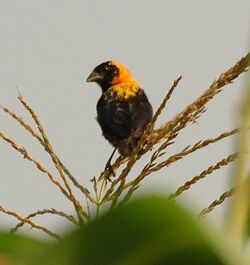Biology:Black bishop
| Black bishop | |
|---|---|

| |
| Male in Bigodi Swamp, Uganda | |
| Scientific classification | |
| Domain: | Eukaryota |
| Kingdom: | Animalia |
| Phylum: | Chordata |
| Class: | Aves |
| Order: | Passeriformes |
| Family: | Ploceidae |
| Genus: | Euplectes |
| Species: | E. gierowii
|
| Binomial name | |
| Euplectes gierowii Cabanis, 1880
| |
| Synonyms | |
|
Pyromelana ansorgei | |
The black bishop (Euplectes gierowii) is a species of passerine bird in the family Ploceidae native to Africa south of the Sahara.[2] Three subspecies are recognised.
Taxonomy
The black bishop was first described by the German ornithologist Jean Cabanis in 1880 and named after H. Gierow, a Swedish explorer and collector in Angola.[3] It is sometimes placed with E. aureus and E. hordeaceus in a separate genus, Groteiplectes.[4]
A study of the molecular phylogeny of bishops and widowbirds published in 2008 found that it formed part of a clade along with the fire-fronted bishop (E. diadematus), black-winged red bishop (E. hordeaceus), northern red bishop (E. franciscanus), southern red bishop (E. orix), Zanzibar red bishop (E. nigroventris) and red-collared widowbird (E. ardens).[5] An alternate common name is Gierow's bishop.
Subspecies
Three subspecies of the black bishop are now recognized.[4][6]
- E. g. ansorgei (E. Hartert, 1899), or northern black bishop, inhabits Cameroon, the Central African Republic, Republic of the Congo, Democratic Republic of the Congo, South Sudan, Ethiopia, Uganda, and Kenya – especially around Lake Victoria basin and Kakamega.[7] This subspecies is named after its discoverer Dr. W. J. Ansorge.[8]
- E. g. gierowii Cabanis, 1880, known as the Angola black bishop, inhabits Angola and the Democratic Republic of the Congo.
- E. g. friederichseni Fischer and A. Reichenow, 1884, or southern black bishop, inhabits Kenya and Tanzania around Babati, and sporadically to Lake Manyara and Serengeti National Park; possibly along Southern Uaso Nyiro River.[7]
Description

Distribution and habitat
The black bishop is native to Angola, Cameroon, Central African Republic, Republic of the Congo, Democratic Republic of the Congo, Ethiopia, Kenya, South Sudan, Tanzania, and Uganda. Its preferred habitats are grasslands, shrublands, and wetlands.[1]
Behaviour
The black bishop can sometimes be found in small flocks, but is not a highly gregarious species,[9] especially when nesting.[7] It is probably polygynous. The male defends the territory during breeding season.[10]
References
- ↑ 1.0 1.1 BirdLife International (2016). "Euplectes gierowii". IUCN Red List of Threatened Species 2016: e.T22719172A94615586. doi:10.2305/IUCN.UK.2016-3.RLTS.T22719172A94615586.en. https://www.iucnredlist.org/species/22719172/94615586. Retrieved 5 December 2023.
- ↑ "Black Bishop Euplectes gierowii". BirdLife International. http://www.birdlife.org/datazone/speciesfactsheet.php?id=8581.
- ↑ Jobling, James A. (1991). A Dictionary of Scientific Bird Names. Oxford University Press. p. 94. ISBN 0-19-854634-3. https://archive.org/details/dictionaryofscie0000jobl.
- ↑ 4.0 4.1 "Black Bishop (Euplectes gierowii)". Internet Bird Collection (IBC). http://ibc.lynxeds.com/species/black-bishop-euplectes-gierowii.
- ↑ Prager, M.; Johansson, E. I. A.; Andersson, S. (2008). "A molecular phylogeny of the African widowbirds and bishops, Euplectes spp. (Aves: Passeridae: Ploceinae)". Molecular Phylogenetics and Evolution 46 (1): 290–302. doi:10.1016/j.ympev.2007.09.010. PMID 17964815.
- ↑ Mayr, E, ed (1962). Check-List of Birds of the World. Volume 15. Cambridge, Massachusetts: Museum of Comparative Zoology. p. 66. https://archive.org/stream/checklistofbirds151962pete#page/66/mode/1up.
- ↑ 7.0 7.1 7.2 Zimmerman, Dale A.; Pearson, David J.; Turner, Donald A. (2005). Birds of Kenya and Northern Tanzania. London: Christopher Helm. p. 545. ISBN 978-0-7136-7550-4.
- ↑ Ansorge, W. J. (1899). Under the African sun. New York: Longmans, Green, and Co.. p. 344. https://archive.org/stream/underafricansund00anso#page/n400/mode/1up.
- ↑ Williams, John G; Arlott, Norman (1980). A Field Guide to the Birds of East Africa. London: Collins. p. 377. ISBN 0-00-219179-2. https://archive.org/details/fieldguidetobird00will/page/377.
- ↑ Craig, Adrian J. F. K. (1980). "Behaviour and evolution in the genus Euplectes". Journal of Ornithology 121 (2): 144–161. doi:10.1007/BF01642928.
External links
- Dozens of names in other languages
- Black bishop species text on Weaver Watch
Wikidata ☰ Q1304641 entry
 |


